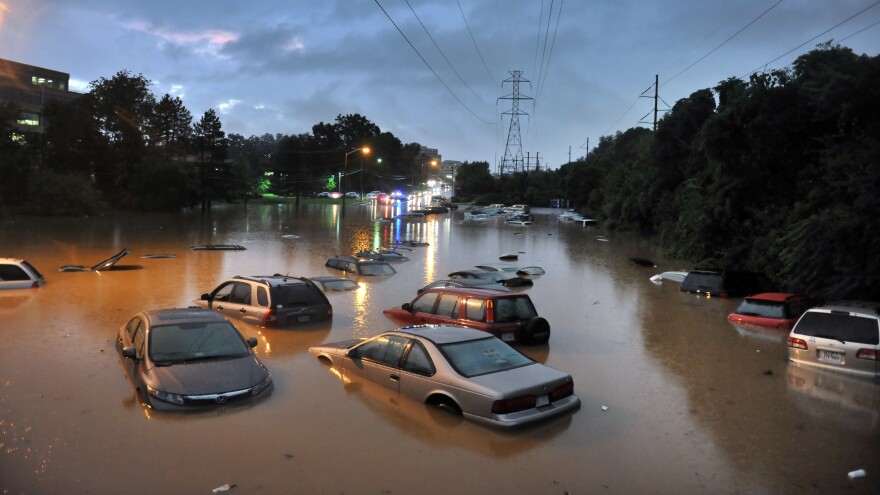A quarter of the roads in the United States would be impassable during a flood, according to a new study by First Street Foundation that looks at flooding threats to the country's critical infrastructure.
The report estimates that more than 2 million miles of road are at risk from floods. It also says that floods could shut down a quarter of critical buildings and facilities, including airports, hospitals, government buildings, houses of worship, museums and schools. First Street's study arrives after a summer of floods that killed dozens of people in the U.S. and destroyed billions of dollars worth of infrastructure.
What communities are most at risk? The report identifies regions with "well established flood risk," like flood plains along the Gulf of Mexico and Southeastern coast. But First Street's risk assessment also provides city and county level insights for every state and Washington D.C. "We're capturing a lot more flooding in places that traditionally you wouldn't think of as high flood risk areas like West Virginia and eastern Kentucky," says Jeremy Porter, head of research and development at First Street, a non-profit, technology-focused research group.
The report — First Street's third national assessment of flood risk — builds on its past findings about residential properties. These new findings for roads, critical buildings and commercial properties are even more pressing, Porter says.

"We found actually 25% of all critical infrastructure was at risk across the country, whereas only about 14% of residential properties were at risk," Porter says. Of all the property types, he adds, "residential properties were actually the least at risk."
Those risks to infrastructure will only worsen with time as floods get more frequent and severe because of extreme precipitation and sea level rise fueled by climate change.
First Street found that, while 2 million miles of roads today are affected now, the number is expected to jump to 2.2 million miles in 30 years. Commercial properties can expect a 7% increase in risk associated with flooding between 2021 to 2051. There are 35,776 critical infrastructure facilities at risk today from flooding, according to the study. That number would jump to 37,786 facilities by 2051.
A handful of measures to protect roads and building infrastructure from flooding are included in two key pieces of legislation mired in Congress: the $1 trillion infrastructure bill and a $3.5 trillion budget reconciliation package.
But federal funding is just one component, Porter says. Resources like First Street's Flood Factor tool, which allows people to find their property's risk of flooding along with future projections, can help Americans act proactively. And big cities are already monitoring their flood risk. But smaller communities will need more help to step up flood protection.
"Miami, New York, they have the money, they have engineers, they can do a lot of this stuff themselves. But the vast majority of communities around the country don't have any idea of what their risk is," Porter says. "Part of this infrastructure bill is, there's a climate component to it, but there's also a [need] that communities understand their risk and apply for the funds" that Congress is trying to pass.
Copyright 2021 NPR. To see more, visit https://www.npr.org.




